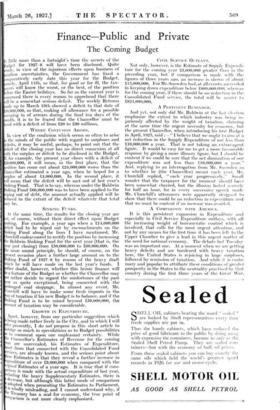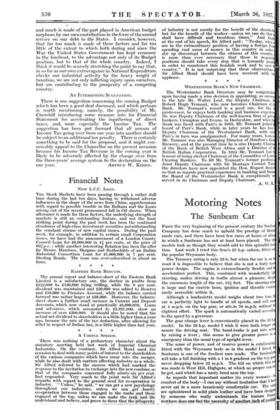Finance—Public and Private
The Corning Budget little more than a fortnight's time the secrets of the udget for • 1927-8 will have been disclosed. Quite iselv, in view of the injurious effects upon business of axation uncertainties, the Government -has fixed a nparatively early date this year for the Budget, amely, April llth, so that, for good or for ill, the tax- avers will know the worst, or the best, of the position ibre the Easter holidays. So far as the current year is teemed there is every reason to apprehend that there ill be a somewhat serious deficit. The weekly Returns lade up to March 19th showed a deficit to that date of 18,000,000, so that, making all allowance for a possible weeping in, of arrears during the final ten days of the loath, it is to be feared that the Chancellor must be teed with a deficit of from £20 to £80 millions.
WHERE CONFUSION ARISES.
In view of the confusion which seems so often to arise the minds of the public with regard to surpluses and elicits, it may be useful, perhaps, to point out that the efieit of the closing year has no direct connexion at all ith the surplus or deficit to he disclosed in the Budget. f, for example, the present year closes with 'a deficit of 20,000,000, it will mean, in the first place, that the osition has come out about £24,000,000 worse than the hancellor estimated a year ago, when he hoped for a urplus of about £4,000,000. In the second place, it ill mean that the deficit will be met out of last years 'liking Fund. That is to say, whereas under the Baldwin inking Fund £60,000,000 was to have been applied to the 'ping out of debt, the amount actually applied will be used to the extent of the deficit whatever that total my be.
SINKING FUNDS.
At the same time, the results for the closing year are at, of course, without their direct effect upon Budget taking. For example, a year ago when a £14,000,000 efieit had to be wiped out by encroachments on the inking Fund along the lines I have mentioned, Mr. 'hurchill endeavoured to rectify the position by increasing he Baldwin Sinking Fund for the next year (that is, the ear just closing) from £50,000,000 to £60,000,000. On he same sound principle, he should, of course, on the 'resent occasion place a further large amount on to the inking Fund of 1927-8 by reason of the heayy draft hich he will have made on the last year's funds. I ther doubt, however, whether this heroic finance will a feature of the Budget or whether the Chancellor may of rather decide to regard the misfortunes of the past ear as quite exceptional, being connected with the rolonged coal stoppage.- In almost any event, Mr. hurchill will have to make some fresh imposts in the y of taxation if his new Budget is to balance, and if the Inking Fund is to be raised beyond £50,000,000, the mount of taxation- may be considerable. •
GROWTH IN EXPENDITURE.
Apart, however, froint. one particular suggestion which being made rather freelY in the City, and to which I will efer presently, I do not propose in this short article to ndolge so much in speculations as to Budget possibilities • to comment upon one unpleasant certainty. While he Chancellor's Estimates of Revenue for the coming ear are unrevealed, his Estimates of Expenditure, part from that connected with the Consolidated Fund "vices, are already known, and the serious point about ese EstimateS is that they reveal a further increase in sPenditure of over £8,000,000 when compared With the rigina/ Estimates of a year ago. It is true that if corn- arison is made with the actual expenditure of last year, eluding the heavy Supplementary: Estimates, there is decrease, but although this latter mode of comparison adopted when presenting the Estimates to Parliament, he Is Wholly misleading and I cannot understand why, if TreaSllTy has- a Zeal' for economy, the true point of IbrarisOn is not more clearly emphasized. Not only, however, is the Estimate of Supply Expendi- ture for the coming year £3,000,000 greater than in the preceding year, but if comparison is made with the figures of three years ago, an increase is shown .of about. £15,000,000.. For Mr. Snowden loo l, at. all events, succeeded in keeping down expenditure below £800,000,000, whereas for the coming year, if there should 'be no reduction in the Consolidated Fund service, the total will be nearer to £824,000,000, • A PERTINENT REMINDER.
And yet, not only did Mr. Baldwin at the last election emphasize the extent to which industry was being in- juriously affected by the weight of taxation, claiming at the same time the urgent necessity for economy, but the present Chancellor, when introducing his first Budget in April, 1925, said :—" I believe that we ought to aim at a net reduction in the Supply Expenditure of not less than £10,000,000 a year. That is not taking an extravagant figure. It would be easy for me to get a more favourable response by giving a more illusory figure, but I should 1w content if we could be sure that the net diminution of our expenditure was not less than £10,000,000 a year." And, replying to an interrogation from Mr. Snowden as to whether he (the Chancellor) meant each year, Mr. Churchill replied, " each * year progressively." Small wonder that the taxpayer for the moment should have been somewhat cheered, but the illusion lasted scarcely for half an hour, for in every successive speech made Mr. Churchill's utterances were apparently designed to show that there could be no reduction in expenditure and that we must be content if an increase was avoided.
A COMPARISON WITH AMERICA.
It is this persistent expansion in Expenditure alit( especially in Civil Service Expenditure outlays, with all the increasing weight of bureaucratic control which is involved, that calls for the most urgent attention, and not by any means for the first time it has been left to the Upper Chamber to give a lead in this urgent matter of the need for national economy. The debate last Tuesday was an important one. At a moment when we are getting heavy deficits and are burdened with heavy taxation here, the United States is rejoicing in huge surpluses, followed by remission of taxation. And while it is custo- mary and popular to attribute these conditions of greater prosperity in the States to the neutrality practised by t hat country during the first three years of the Great 1.Var. and much is made of the part played in American budget tunpluses,by our own contribution in theforni-of_the annual service on our debt to the States. I consider, however, that far too much is made of these factors and far too little of the extent to which both during and since the. War the United States Government has kept economy in the forefront, to the advantage not only of its Budget position. but to that of the whole country. Indeed, I think it would be scarcely stretching the point to say that, in so far as our own extravagance in National Expenditure checks our industrial activity by the heavy weight of taxation, we are not only inflicting injury upon ourselves, but are contributing to the prosperity of a competing country.
AN INTERESTING SUGGESTION.
There is one suggestion concerning the coming Budget which has been a good deal discussed, and which perhaps is worth mentioning, namely, the possibility of Mr. Churchill introducing some measure into his Financial Statement for accelerating the ingathering of direct taxes, and, more especially the Inclime Tax. The suggestion has been put forward that all arrears of Income Tax going over from one year into another should be subject to an additional tax penalty. There is certainly something to be said for the proposal, and it might con- ceivably appeal to the Chancellor on the present occasion because his Income Tax Revenue in the coming year is likely to be adversely affected by the change over from the three-years' average system to the declaration on the























































 Previous page
Previous page